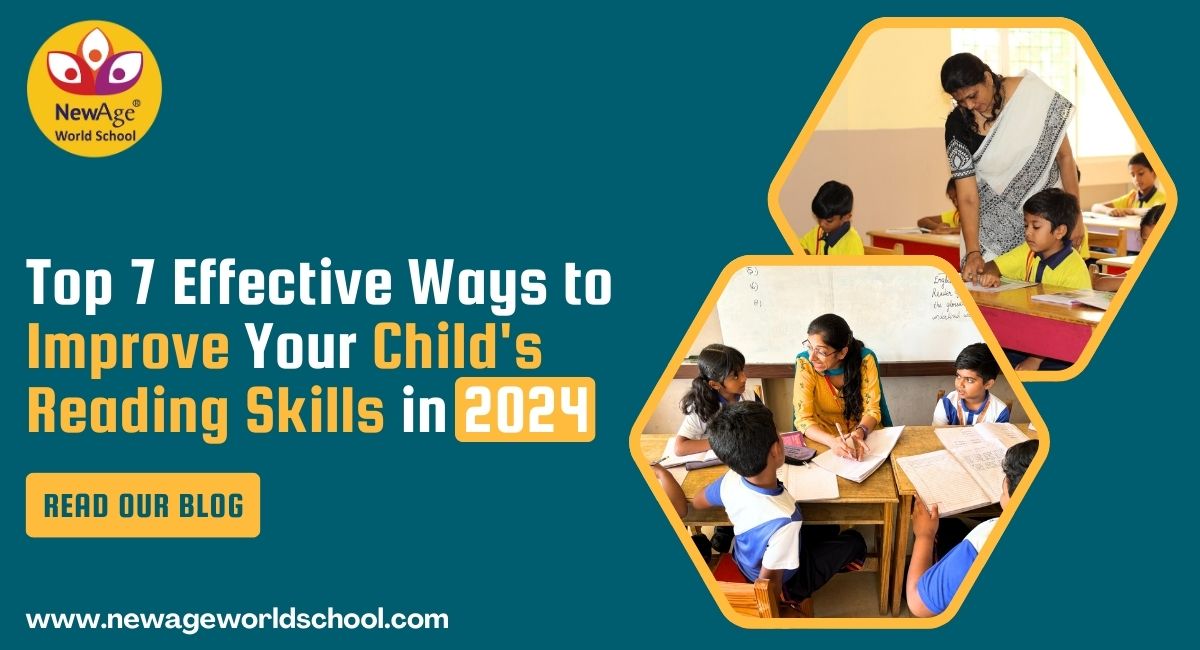Top 7 Effective Ways to Improve Your Child's Reading Skills in 2024

Table of content
Read Aloud and Together
Practice Makes Perfect – Re-read for Fluency
Make Reading a Daily Habit
Ask Questions to Build Understanding
Use a Variety of Reading Materials
Find Books That Match Their Level
Make Reading Fun and Rewarding
Final Thoughts
FAQ
Introduction
Reading is like opening a magical door to new worlds, ideas, and endless learning. However, not every child takes to reading naturally. Some children struggle with it, while others might find it boring or challenging. As parents or teachers, we want our children to love reading and get better at it. So, how can we help them? Let us dive into the top 7 effective ways to improve your child's reading skills in 2024. These simple tips will make reading fun and boost their confidence and knowledge!
1. Read Aloud and Together
One of the best and simplest ways to start improving reading skills in children is by reading aloud to them. This is for more than just little kids; even older children enjoy a good story time. Reading together makes the whole process less of a "chore" and more of a shared experience. Pick up a storybook, a magazine, or a newspaper, and read with your child. Doing this helps them hear how words are pronounced, and sentences flow, making it easier for them to mimic when they read independently.
For younger children, how to teach reading to children at home often begins with reading aloud. Choose books with fun pictures and simple sentences. Let them see how the words match the pictures. For older children, you can pick more complex books and even take turns reading paragraphs out loud.
2. Practice Makes Perfect – Re-read for Fluency
Imagine if you tried riding a bicycle just once and gave up! Reading works the same way. If your child finds a book or story they like, encourage them to re-read it. Re-reading not only helps in improving reading skills but also builds fluency. The more they review the same text, the easier it is for them to recognize words and understand the meaning without stumbling.
You can introduce some of the best books for improving reading fluency here. Books like "The Cat in the Hat" by Dr. Seuss are great for young readers, while "Charlotte's Web" by E.B. White can be wonderful for older children. Choose books that suit their reading levels. Selecting the best books for children's reading level will give them the right balance between challenge and success.
3. Make Reading a Daily Habit
Reading should be a daily habit, like brushing teeth or eating breakfast. Setting aside 15-20 minutes a day can make a big difference. You could make this time special by creating a cozy reading nook with pillows, blankets, and a good light in your house. This habit will teach your child that reading is not just something for school but a lifelong skill.
Reading time is often built into the daily schedule in schools, especially at an International School in Yelahanka. However, improving reading skills at school works best when paired with regular reading time at home. Plus, with this daily habit, your child will slowly begin to see reading as a way to unwind and learn.
4. Ask Questions to Build Understanding
After your child reads a book or an article, ask questions about it. This method is known as tips for reading comprehension. Did they understand the story? Can they explain what happened? Who were the main characters? When children talk about what they have read, it helps them connect ideas and improves their understanding.
For example, if they read a story about a rainy day, ask them, "What would you do on a rainy day?" This discussion can lead to fun conversations and deeper learning. Asking questions also strengthens critical thinking, which is key for reading strategies for students.
Also read: Are You Struggling to Study? Check These 10 Proven Tips
5. Use a Variety of Reading Materials
Reading is not just about storybooks. Mix it up! Have them read newspapers, magazines, articles, or even recipes. You can teach them how to read newspapers for children by picking out short news stories, cartoons, or even fun facts. This variety exposes children to different types of writing and vocabulary.
When you give your child different things to read, they learn new words, sentence structures, and writing styles. This helps them expand their vocabulary naturally. Plus, they might discover new interests, like science, animals, or cooking!
6. Find Books That Match Their Level
It is very important to pick books that match your child's reading levels. If a book is too hard, it can make them feel frustrated. On the other hand, if it is too easy, they might get bored. Start by finding their reading level. Like the International School in North Bangalore, most schools have programs to determine each child's reading stage. Once you know, pick books that are at the right level.
A simple way to find the right book is to have them read the first page aloud. It might be too challenging if they struggle with more than five words. Books at the right level will help build their skills while keeping them interested.
7. Make Reading Fun and Rewarding
Children are more likely to read if they think it is fun! Create a little "reading challenge" at home. For example, for every five books they read, they get a small reward – a sticker, a fun outing, or maybe an extra 15 minutes of playtime. This makes reading a positive experience.
If your child has shown a real love for reading, encourage it! Maybe share stories about how reading changes lives or the power of reading.
Also read: The Power of Reading
Final Thoughts
Helping your child become a confident reader takes patience, encouragement, and a small quantity of creativity. With these effective ways to enhance reading skills, your child will get better at reading and start to enjoy it. Whether through daily practice, asking questions, or picking the right books, each step forward is a win!
Reading is a lifelong gift. So, be there to cheer them on, offer a helping hand, and share in their joy of discovering new worlds through words. After all, the importance of reading skills goes beyond school – it is a tool for a lifetime of learning and success. So, grab a book, get cozy, and let the reading adventure begin!
Frequently Asked Questions
What are the ways to improve reading skills?
You can improve reading skills by setting aside daily reading time, using various reading materials, asking questions about the text, and choosing books at the right level. Interactive activities like storytelling, games, and rewards can make reading engaging and effective.
How can we boost weak reading abilities?
To improve week reading abilities:
1. Focus on building a strong vocabulary and practice reading aloud.
2. Encourage re-reading favorite books to build fluency and provide help when they struggle with words.
3. Most importantly, make reading a fun, stress-free activity.
How do I teach my child reading skills?
Start by reading together and choosing age-appropriate books. Use simple phonics games, point out words during daily activities, and introduce a variety of reading materials like newspapers, comics, and storybooks. Patience and consistency are key.
How do I increase my child's reading level?
To increase your child's reading level, select slightly challenging yet enjoyable books. Encourage daily reading, use fun activities like reading aloud, and ask questions about the story to boost comprehension. Regular practice and positive reinforcement work wonders!

















Leave a Reply
Your email address will not be published. Required fields are marked *
Comments
No comments available